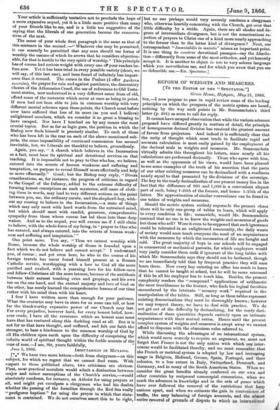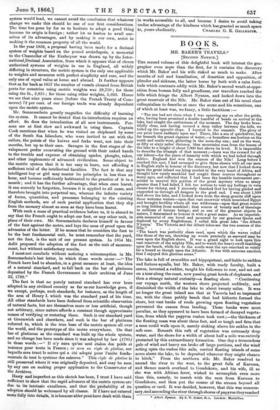REFORM OF WEIGHTS AND MEASURES. [I'o THE EDITOR OF THE
"SPECTATOR."] Grove House, Highgate, May 31, 1866. SIR,-I now propose to pass in rapid review some of the leading principles on which the prospects of the metric system are based, noticing by the way such points in Mr. Sonnenschein's third letter (p. 494) as seem to call for reply.
It cannot have escaped observation that while the various schemes proposed have differed greatly in matters of detail, the principle of homogeneous decimal division has received the greatest amount of favour from projectors. And indeed it is sufficiently clear that the unity of thought which most tends to facilitate rapid and accurate calculation is most easily gained by the employment of the decimal scale in weights and measures. Mr. Sonnenschein virtually admits this throughout his letters, since nearly all his calculations are performed decimally. Those who agree with him, as well as the opponents of his views, would have been pleased to see some examples of the truth of his assertion that the parts of our other existing measures can be decimalized with a readiness nearly equal to that presented by the divisions of the sovereign. The key to the ready decimalization of our present money lies in the fact that the difference of 960 and 1,000 is a convenient aliquot part of each, being 1-24th of the former, and hence 1-25th of the latter. No approximation of similar convenience can be found in our tables of weights and measures.
Should the metric system entirely supersele the present chaos there will be only one group of tables to learn, which will apply to every condition in life ; meanwhile, would Mr. Sonnenschein contend that no one is to know the weights and measures of goods but those who sell? Were it even to be supposed that such ignorance could be tolerated in an enlightened community, the daily wants of society would soon teach everyone the need of an acquaintance with the measures by which the necessaries of life are bought and sold. The great majority of boys in our schools will be engaged in commercial or mechanical pursuits, for which employers would very justly consider them unfit if ignorant of the long tables with which Mr. Sonnenschein says they should not be bothered, though we are immediately told that by frequent practice they will soon learn them. Now every boy entering an office has much to learn that he cannot be taught at school, but he will be more esteemed if this be all his employer has to teach him. Besides, the present complexity renders the " compound " applications of arithmetic the most troublesome to the learner, who finds his logical faculties encumbered by the intricate "memory work" required in the manipulation of the tables. Still, as long as these tables represent existing denominations they must be thoroughly known ; however we may respect theory, we have to deal with practice. We do not get out of the difficulty by decimalizing, for the ready deci- malization of these quantities depends entirely upon an intimate acquaintance with their mutual ratios. Hence until the present complex system of weights and measures is swept away we cannot afford to dispense with the obnoxious rules referred to.
While discussing the advantages of an international system, which would seem scarcely to require an argument, we must not forget that France is not the only nation with which our inter- course would be facilitated thereby, and we must remember that the French or metrical system is adopted by law and increasing usage in Belgium, Holland, Greece, Spain, Portugal, and their colonies, to a less extent in Italy, Switzerland, Denmark, and Germany, and in many of the South American States. When we consider the great benefits already conferred on our own and other countries by reciprocal commeccial concessions, when we mark the advances in knowledge and in the arts of peace which have ever followed the removal of the restrictions that keep nations apart, and when we estimate the gain in convenience of traffic, the easy balancing of foreign accounts, and the almost entire roma a grounds of dispute to which an internatiomil
system would lead, we cannot avoid the conclusion that whatever change we make this should be one of our first considerations. The time has gone by for us to hesitate to adopt a good thing because its origin is foreign ; rather let us hasten to avail our- selves of its advantages, and by making it our own, assist in making it the common property of all the world.
In the year 1859, a proposal having been made for a decimal system of weights based on the pound avoirdupois, a memorial to the Chancellor of the Exchequer was drawn up by the Inter- nationalpecimal Association, from which it appears that of eleven authorized systems of weights in use in England, all widely differing in structure, the metric system is the only one applicable to weights and measures with perfect simplicity and ease, and the only one of equal value at home and abroad. It further appears that as far back as 1857 the number of vessels cleared from British ports for countries using metric weights was 29,759; for those using the lb., 2,935; for those using other weights, 5,693. Hence we see that nine years since (before the French Treaty of Com- merce) 72 per cent. of our foreign trade was already dependent upon the metric system.
Mr. Sonnenschein greatly magnifies the difficulty of learning the system. It cannot be denied that its introduction requires an effort. So does the introduction of all new instruments. Per- sons are at first slow and awkward in using them. Captain Cook mentions that when he was visited on shipboard by some of the South Sea Islanders, who were invited to eat with the sailors, the points of the knives and forks went, not into their mouths, but up to their ears. Savages in the first stages of de- velopment prefer excavating the ground with their naked hands to the trouble and expense of obtaining spades, ploughs, rakes, and other implements of advanced civilization. Some object to the metric system that it is too easy to learn, not affording a sufficient trial of the intellectual faculties. The fact is that any intelligent boy or girl may master its principles in lass than an hour, and become sufficiently habituated to the practice of it in a month ; and it has the further advantage, that when once learnt, it can scarcely be forgotten, because it is applied to all cases, and therefore brought into perpetual use, whereas the infinite variety of forms, quantities, and processes belonging to the existing English methods, are of such partial application that they slip from the memory almost as soon as they have been learnt.
With such a mass of practical evidence before us, it is absurd to say that the French ought to adopt our foot, or any other unit, in place of their own. Mr. Sonnenschein declares himself in favour of the foot against the metre, and lays the onus of proof upon the advocates of the latter. If he means that he considers the foot to be the best fundamental unit, he must remember that the yard, not the foot, is the unit of our present system. In 1854 Mr. Aslit proposed the adoption of the foot as the unit of measure- ment, but without satisfactory results.
I must not conclude without noticing a misconception in Mr.
Sonnenschein's hat letter, in which these words occur The French have had to abandon, in a great measure at least, the idea of a natural standard, and to fall back on the bar of platinum deposited by the French Government in their archives of June 22, 1799."
The fact is that no purely natural standard has ever been adopted in any civilized country as far as our knowledge goes, if we except, perhaps, such standards, for instance, as the length of the arm of Henry I. which was the standard yard of his time. All other standards have been deduced from scientific observation of natural facts, but are themselves more or less artificial, though not arbitrary, since nature affords a constant though approximate means of verifying or restoring them. Such is our standard yard at Greenwich and elsewhere, and such is the bar of platinum referred to, which is the true base of the metric system all over the world, and the prototype of the metre everywhere. On that bar of platinum as the standard was built up the whole system, and no change has been made since it was adopted by law (1795) in these words :—" IL n'y aura qu'un seed etalon des poids et mesures pour touts la France ; ce sera un regle de platint, stir laquelle sera trace le metre qui a ad adopts pour Punite fonda- mentale de tout le systeme des mesures." This regle de platine is stall preserved where it was originally deposited, and may be seen by any one on making proper application to the Conservator of the Archives.
Hasty and imperfect as this sketch has been, I trust I have said sufficient to show that the rapid advances of the metric system are due to its intrinsic excellence, and that the probability of its adoption should be welcomed by all classes. If I have not entered more fully into details, it is because abler pens have dealt with them
in works accessible to all, and because I desire to avoid taking undue advantage of the kindness which has granted so much apace































 Previous page
Previous page